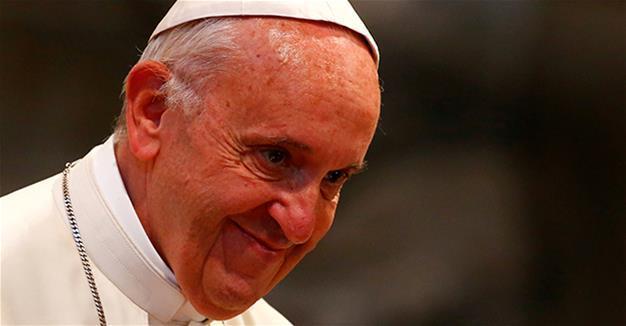Pope to visit Myanmar, Bangladesh as Rohingya crisis intensifies
YANGON – Agence France-Presse

REUTERS photo
Pope Francis will visit Myanmar and Bangladesh later this year, the Vatican announced on aug. 28, hours after the Catholic leader decried the plight of Rohingya Muslims as they flee fresh fighting between the army and militants.
The landmark visit in late November and early December takes in Myanmar-- a largely Buddhist country plagued by inter-religious fighting -- and Muslim-majority Bangladesh which hosts hundreds of thousands of refugees from that conflict.
Francis has frequently lamented the treatment of the Rohingya, a largely stateless Muslim minority who have long lived under apartheid-like restrictions in the western Myanmar state of Rakhine.
Tens of thousands have fled to Bangladesh in recent months to escape fighting between Rohingya militants and Myanmar’s army -- with particularly ferocious clashes erupting in the last few days.
Announced simultaneously on Aug. 28 in Rome, Yangon and Dhaka, the visit will see Pope Francis travel first to Myanmar on Nov. 27 to 30, taking in Yangon and the capital Naypyidaw.
On Nov. 30 he will travel to the Bangladeshi capital Dhaka, leaving on Dec. 2.
It is the first time a pope has travelled to Myanmar and only the second time a papal visit has been made to Bangladesh after Pope John Paul II’s trip there in 1986.
Myanmar boasts somewhere between 500-800,000 Catholics while Bangladesh has an even smaller community of some 350,000 adherents.
Myanmar and the Vatican only established full diplomatic relations in May, shortly after de facto leader Aung San Suu Kyi met Pope Francis during a European tour.
That visit was overshadowed by her country’s treatment of the Rohingya.
Only weeks before Francis had described the Muslim minority as “brothers and sisters” who were were being tortured and killed for their faith.
He added they were “good and peaceful people who have suffered for years,” and urged Catholics to pray for them.
On Aug. 27, as fresh fighting raged in Rakhine state, he hit out once more at the “sad news about the persecution of the religious minority of our Rohingya brothers.”
“I would like to express my closeness to them and all of us ask the Lord to save them and to prompt men and women of good faith to help them and ensure their full rights,” he added.
Impoverished Rakhine, which neighbors Bangladesh, has become a crucible of religious hatred focused on Rohingya, who are reviled and perceived as illegal immigrants in Buddhist-majority Myanmar.
Despite years of persecution and government restrictions, the Rohingya largely eschewed violence.
But sporadic armed clashes have erupted since October when a previously unknown Rohingya militant group staged a series of attacks on security forces, sparking a massive crackdown by Myanmar’s military which the U.N. believes may have amounted to ethnic cleansing.
A brutal round of fresh fighting has been raging since Aug. 25 when militants staged new coordinated ambushes.
More than 100 people, including some 80 militants, have been confirmed killed.
Thousands of Rohingya civilians have fled towards Bangladesh while local Buddhists and Hindus have sought sanctuary in towns and monasteries away from the clashes.
Both sides have accused each other of committing fresh atrocities in recent days, accusations that are difficult to verify because the fighting is taking place in inaccessible villages.
Suu Kyi’s government has dismissed accusations of atrocities and refused visas to U.N. officials tasked with investigating the allegations -- a stance that has caused dismay overseas.
Analysts say Suu Kyi knows there is little domestic political advantage in supporting the Rohingya while her civilian administration has limited control over the country’s notoriously abusive military.
Buddhist nationalist hardliners in Myanmar have previously vowed to protest any papal visit because of the Pope’s sympathy for the Rohingya.
While they may not see eye to eye on the Rohingya, the Vatican is keen to court Myanmar’s government now that diplomatic ties are established.
A key issue for the Church in Myanmar is its ability to support Catholic education. All Church schools were nationalized in 1965 following the 1962 military coup in the former British colony.
The Church has recently been able to invest in schools again but supported establishments have to be registered in the names of private individuals rather than being officially run by the Church.
Strongly Muslim Brunei and the officially communist regimes of China, Laos, North Korea and Vietnam are the only Asian states not to have full diplomatic relations with the Vatican.
